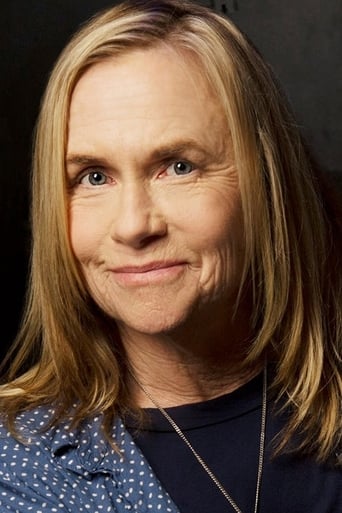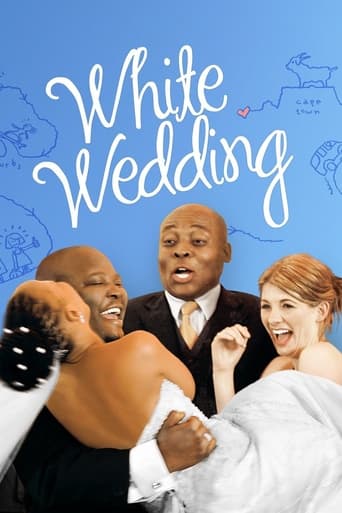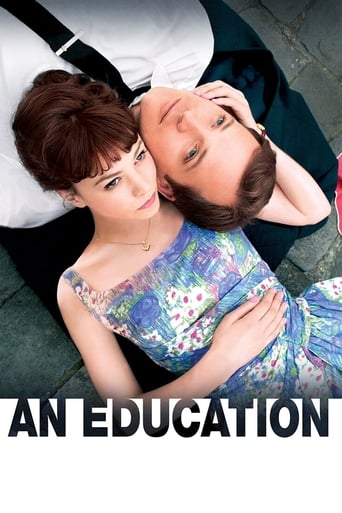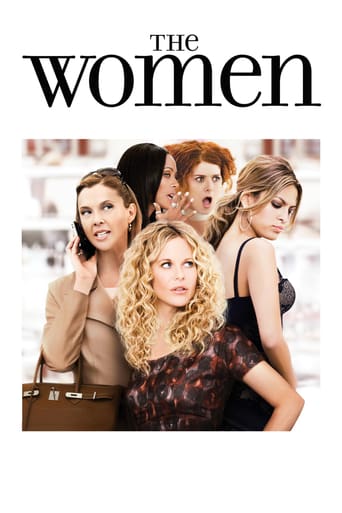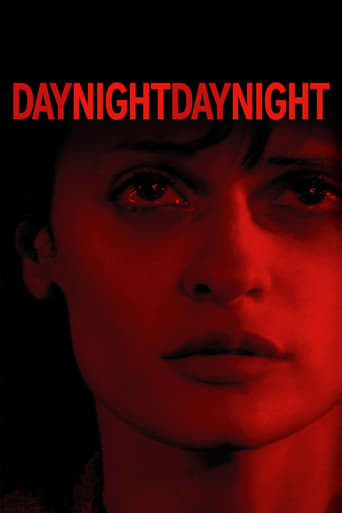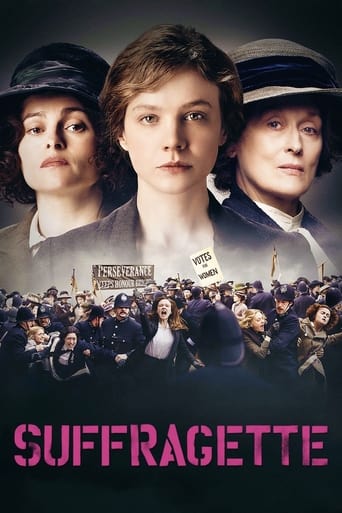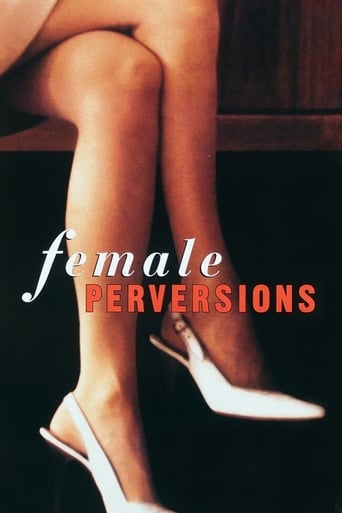
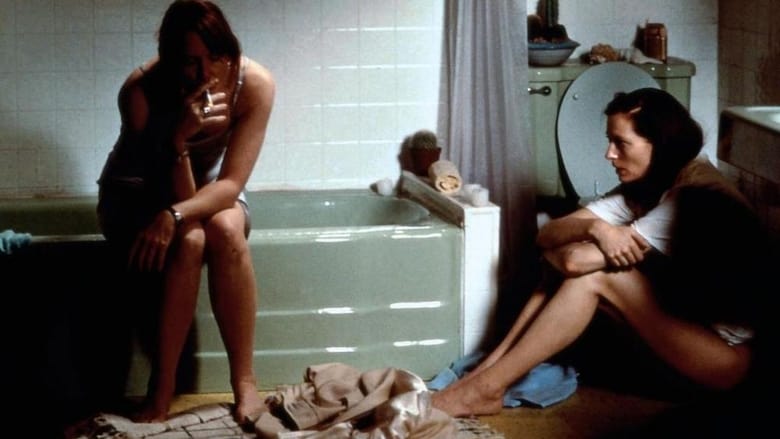
Female Perversions (1997)
An ambitious female attorney wallows in excess and meaningless sex with both male and female partners, while dealing with her personal life problems including helping her kleptomaniac sister.
Watch Trailer
Cast


Similar titles
Reviews
the leading man is my tpye
A clunky actioner with a handful of cool moments.
There is, somehow, an interesting story here, as well as some good acting. There are also some good scenes
Mostly, the movie is committed to the value of a good time.
I have to say that my initial interest in watching this movie was for kicks but when I got more into the plot, I discovered that it could be a great film for describing the female Oedipus complex of women as defined in Psychoanalytic Theory. I thought it was a great film for students learning alternative approaches to female sexuality and Psychology. I would recommend this to any College teacher as a learning tool about Female Psychoanalysis, and Female Sexuality. The sexual material is a little strong but working with the sexuality from the perspective of observational research can be very helpful to enhance the storyline about the subject matter. It was a much more different approach to woman's sexuality than I have ever before experienced. Being a man, the main character is really looking at gender confusion in her life and their are some powerful archetypal images that are also presented in this film. I suspect Jung would have been amazed with this storyline, and Freud might have had a good example of what he calls the female Oedipus complex.
This movie attempted to take the viewer into some dark psychological aspect of feminism that may just be really rare if not unreal- only dark thoughts of the writers personal imagination. This was a truly boring and distasteful experience for me. It was so bad that it might just be an anti-feminist movie in a satirical manner. I know of no positive benefit that anyone could receive from viewing this movie. I would recommend it to anyone stating that even taken to extremes freedom of expression is a positive even if it is not entertaining. If there is one moral to the story it is that the main character (not the heroine by any stretch of the imagination) managed to muddle through and to succeed in obtaining her judgeship in spite of being so dark in personality and screwed up. The viewer should have a special forewarning regarding movies with this degree of darkness...as in D for dark!
I find it interesting that only one or two of the 17 comments here are by women. I'm not sure whether that reflects the proportions of those who saw the movie - or merely those who were (generally) irritated enough to comment on it. The movie is confused. **** SPOILERS **** Very early on, we hear a ludicrous argument by the protagonist in court, one that would provoke laughter in any courtroom, yet there are only sober gazes in response. Why? No one would ever say "We must smash him, crush him" etc. unless they wanted to torpedo any sympathy toward their client. The argument is so funny - yet no one laughs. Why? Later, we hear the protagonist's partner's assessment that the protagonist is a "killer" and therefore a desired judicial appointee. The viewer laughs again - we've seen how poor a lawyer the protagonist is (though briefly) and the idea that the "killer" nature of the lawyer in a civil suit would somehow cause anyone to predict how she would be as a criminal judge - is again ludicrous. (Later, we learn that the Governor is so FAR from eliciting hard-line responses from his potential judicial nominee, that he happily talks about the joy of his five daughters!). So, the viewer assumes we are meant to believe that the protagonist and her partner are deluded in their assessments of legal realities - yet we learn nothing further to confirm the protagonist is a poor lawyer and the partner a deluded man. Why? We see some bizarre store in which only a few articles hang on hangers -and in which old men sit in the lingerie section watching women who parade in front of him (and the mirror). Why are old men allowed to sit there? And again, since the protagonist is an extremely thin woman, when she asks time and again whether the garment is too small - and hears voices telling her she's fat - we are again distanced from the protagonist's sense of reality. We can't trust what she believes about anything later in the movie. We see a sweet and charming new associate interviewing at the firm - however she speaks negatively about the new lipstick she (and the protagonist) have bought - and has therefore brought down the enduring deep loathing and profanity of the protagonist. This is rather funny since lipstick color is perhaps one of the least important decisions in anyone's life. So, of course it distances us from the hating protagonist - yet why should the movie so want us to be distanced from the protagonist? To see her as a foul-mouthed, promiscuous, person easily roused to hatred by superficialities, who has deluded views of reality? A running and repetitious home movie is seen of a woman acting sexually aggressively with a man who wants to read. He finally pushes her away - she falls. I've no idea what this is supposed to represent. (E.g., imagine the aggression taking place on the man's part - his wife wants to read, he undresses, pushes himself upon her - she finally pushes him away, he falls. What would we be supposed to be making of that?). The movie can't be asking us to condemn the man since he was rather obviously showing a lack of interest and the woman was the aggressor - yet the protagonist says "yet I want up to my father" after her mom had fallen. Yes, so? Would she not have gone to her mother if the situation were reversed and the father had been the aggressor climbing upon a mother who had shown she wanted no part of sex that night? What are we supposed to make of this?We are informed by one unstable character that the reason for her persistent crimes is sexual thrill. Yet of course all criminals get sexual thrills from their defiance of society and morality. E.g., think of Leopold and Loeb and the use Hitchcock made of this in "Rope". Yet somehow the protagonist (about to be named a judge!) has never heard of this - and dismisses the citations from psychological treatises read by the criminal. Again, it distances us from the protagonist - why this ignorance? There's certainly nothing related to gender about this. Ask any teenage delinquent of either gender who has stolen something from a store -- or another child -- whether it was thrilling - sure. Crimes are almost always thrilling - so? And what are we to make of the protagonist's ignorance about this?We are shown several scenes establishing a sexual relationship between two women (the protagonist and the psychiatrist). The protagonist has instigated the relationship. After staying through the night, at one point, the psychiatrist leaves the protagonist's home to go somewhere. In the last scene between the two women, the psychiatrist says she wants a different kind of relationship. In what way? We have no idea. The psychiatrist doesn't offer and the protagonist doesn't ask. The music tells us that this is somehow a bad thing - but why?We see a mother (divorced? widowed? never married? We never know - and it would have helped to know) who designs and sells wedding dresses -- she becomes disappointed that her recent relationship has soured. But we know so little of her that we don't know why the relationship has really ended - the cited argument is far too slight to end a relationship that had so progressed that the mother anticipated a proposal - or why this should be important.There are just bizarre instances of human behavior throughout the movie - i) middle aged sisters sharing baths and beds, ii) kleptomaniacs throwing in garbage cans, the object of their theft in full view of the store (but only sometimes - we don't know why she kept some articles and tossed others), iii) absolute rage at having to spend just a few nights in a rural jail despite knowledge of criminal guilt, iv) middle aged lawyers wearing short skirts who continue to sit with their legs over the chair arm -- while engaged in conversation with the partner, v) prospective appointees to the appellate bench who care more about wearing their "lucky suit" than anything else in life, vi) drunken revels by whole office staffs in state office building lobbies, vii) adolescent girls who slash with a razor at clothing everywhere they find it, viii) crazed lawyers sending flowers to themselves with non-romantic notes of congratulation so it can be found by their secretaries, ix) purportedly successful lawyers being able to drop all other matters in an instant to handle their sister's larceny case.The resemblance to real life is zero - but what are we to make of this? We don't know. Incidentally, I'm pretty sure that's reporter, author, editor Bob Woodward playing the Governor - why isn't he or anyone else listed in the credits in the part? Did he wants his name withdrawn? **** SPOILERS END **** The movie is just a mess. I watched it because several actresses I like (Sillas, Porizkova, Madigan, Robins, Cross) were in it. And the acting was fine (particularly a very unusual turn by Frances Fisher) but you'll find yourself resisting a fast-forward throughout the movie. When the mess ends, it's a relief. Better luck to these actresses next time.
While viewing FEMALE PERVERSIONS, I began to wonder if I was losing my mind. For whom was this film made? Who put up the money to make this film? FEMALE PERVERSIONS is pretentious piece of clap trap masquerading as something deep and meaningful. Woman have it rough competing in male dominated society and men are responsible for all of woman neurosis seems to be the message. Ho Hum! Where have we heard that before? Just about every character in this film is angry, nasty, neurotic, and unpleasant, except for teenage "Tomgirl" named Ed, who is just a little mixed up. The scenes of Eve's dreams and hidden memories are down right laughable, like the kind of stuff found in some over indulgent student film. The film has not coherent plot, just a lot of incidents. And would somebody please explain the ending?There are some people who praise this film because it deals with characters searching for their identity, but most of the characters come across as so self absorbed that they evoke no sympathy. The film puts an emphasis on getting in touch with ones "feelings." But when one constantly dwells on his/her feelings, its leads to selfishness and hedonism, a point the films makers seem not to be aware of.



